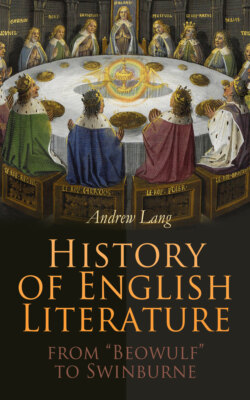Читать книгу History of English Literature from "Beowulf" to Swinburne - Andrew Lang, Robert Kirk - Страница 77
На сайте Литреса книга снята с продажи.
The Kingis Quhair.
ОглавлениеTo people who only know King James I of Scotland in history, his poem, "The Kingis Quhair" (book) must be rather disappointing. Fortune was his foe, as he says in the poem, and the foe of his House.
Born in July, 1394, young James was made prisoner in March, 1405-1406, and, for about eighteen years was a captive in England, or was led with the army of Henry V against his natural ally, Charles VII, the Dauphin of Jeanne d'Arc. The ransom demanded from James when released, in 1423, was ruinous; of his hostages, noblemen, some died in England; he found his country full of anarchy and treason; the disorders he suppressed with illegal vigour; he seized earldoms to which he had no right, he made powerful enemies, and, in 1437, he was slain by Robert Graeme and a band of Highlanders, at the Black Friars' in Perth. In England he had married Joan Beaufort, daughter of the Earl of Somerset, who lived to avenge him on his murderers with unheard-of cruelties.
When a man of James's intellect, character, and experiences writes a poem on his own taking at sea by faithless foes, his own long captivity, and his own love-story, we naturally expect something of poignant personal interest. But we expect what his time, his taste, and his rank forbade him to give. Never was poetical tradition so crushing to originality as the tradition of the "Roman de la Rose".
For centuries each mediaeval poet aimed at saying just what his forerunners had said, and in much the same style: Barbour, of course, is an exception; he does not open with a sleepless night; a book read in bed; a dream of a May morning; a walk to a pretty river, a palace near the river, and all the rest of it. Barbour writes "like a man of this world".
But King James follows the fashion of allegory. He cannot sleep; he reads Boëthius in bed, Boëthius "full of moralities". He lies thinking over his sorrows when (this is original), the bell for matins rings, and
Ay me thought the bell
Said to me, tell on, man, quhat the befell.
He did not think that the Voice was a real Voice, "impression of my thought causes this illusion," said he, and though he had "spent much ink and paper to little effect," he sat down, made a mark of the cross, and set to work at his tale, first comparing his life to a ship in perilous seas, and then briefly mentioning his capture when about three years past the age of innocence (which was seven, he was, when taken, four years past seven). Birds, beasts, and fishes, he says, are free, why does Fortune make me thrall? He looks out of his window into a green garden; the nightingales sing; he sees, and describes very prettily, a fair lady walking with her two maidens, and falls in love. In all probability this is a mere imitation of the first sight of Emily by Palamon and Arcite, in Chaucer's "Knight's Tale". James would meet Jeanne in society: he was not a close prisoner, we are told that he knew many English ladies, and the course of his true love ran smooth enough. But the description is charming, as is the address to the nightingale which follows.
After this long and excellent passage of true poetry, fashion compels the King to visit the Palace of Venus and see the lovers of old times, converse with Venus and with Pallas, and visit Fortune with her Wheel, and take his place on it; then he awakes not "seeing all his own mischance". A white turtle-dove brings him flowers, and a glad message in letters of gold; and he blesses birds and flowers and even his prison wall, and
the sanctis marciall
That me first causit hath this accident.
The poem ends with an invocation of the shades of his "masters dear," Gower and Chaucer.
The manuscript, of about 1488, ascribes the poem to King James, so does Major or Mair, a not too trustworthy historian. The language is northern English, mixed with Scots, with many borrowings from Chaucer. The story indicated is true of James and of no one else, but the usual attempt has been made to deprive him of the authorship—wholly without success. The measure is the "rhyme royal" of Chaucer's "Troilus and Criseyde". The scansion is remarkably correct, and the lines have a melody not common in the works of Chaucer's followers. There is a strong moral element in the reflection and discourses.
